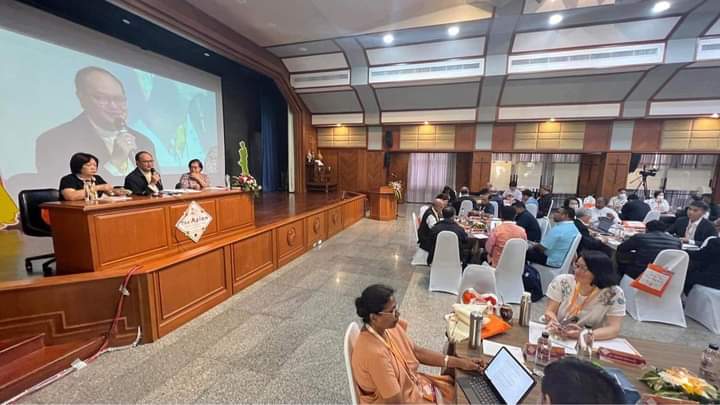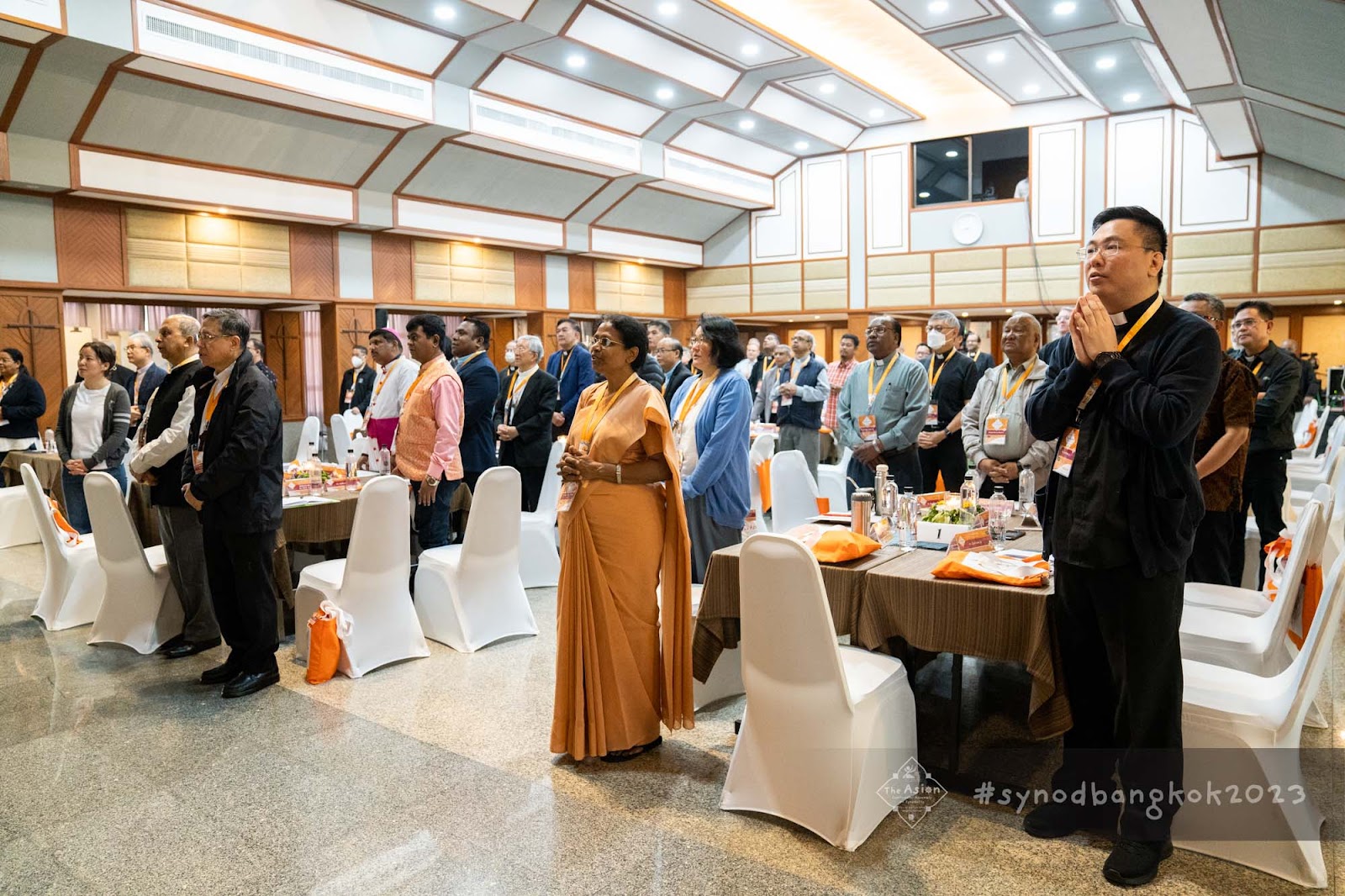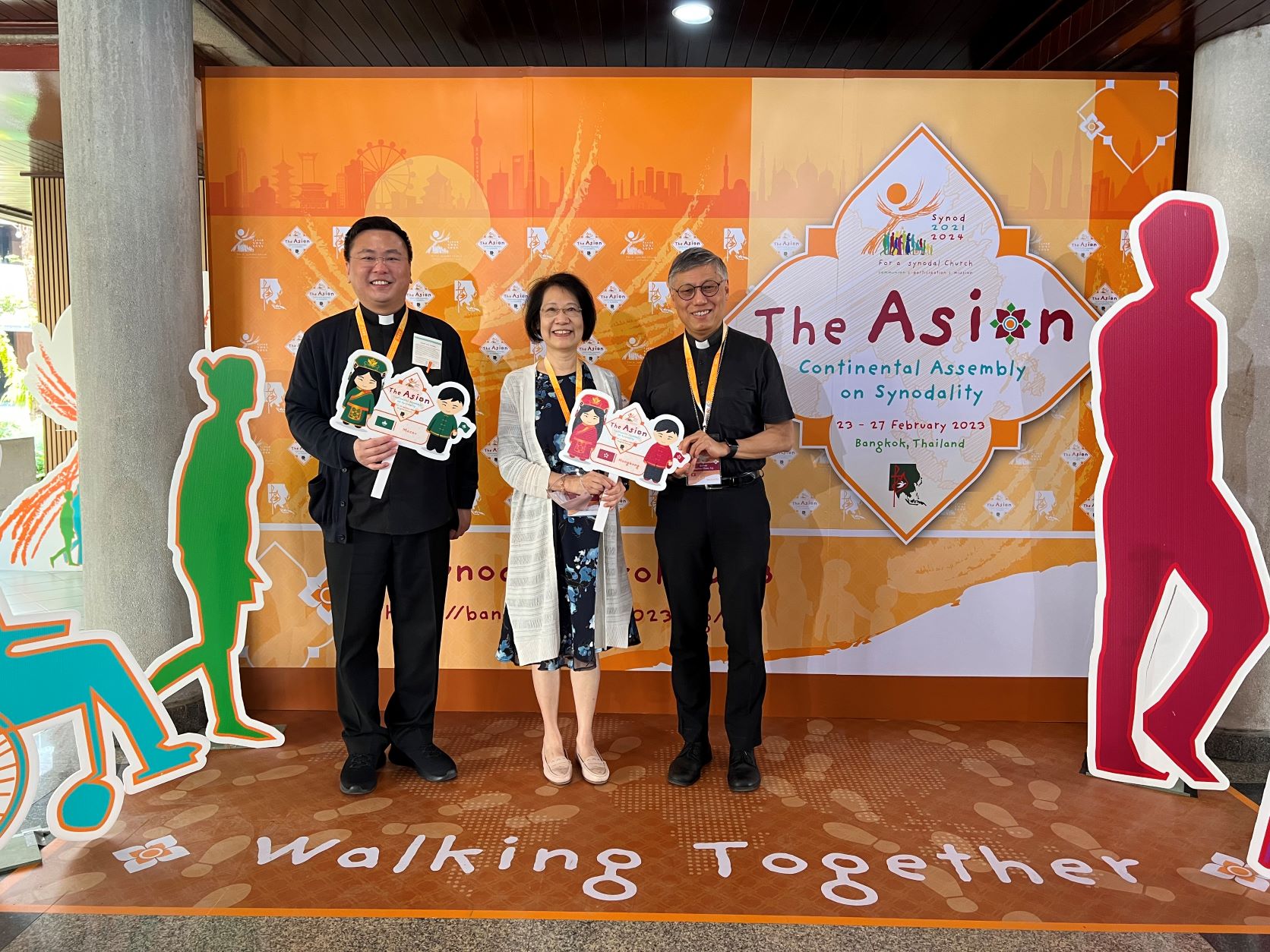O Clarim News Bureau
The Asian Continental Assembly on Synodality was held in Bangkok, Thailand, from February 24 to 26. Bishops, delegates and representatives of different dioceses in the region gathered to exchange thoughts and ideas to contribute another big step forward in the synodal process.
Fr Cyril Jerome Law, Chancellor of the Catholic Diocese of Macau, attended the assembly on behalf of the Church in Macau and shares with O Clarim readers the ideas, thoughts and fruits of the assembly.
Fr Cyril, we understand that we are now in the continental phase of the Synod on Synodality. Could you describe this gathering of the Asian Continental Assembly on Synodality?
This gathering of the Asian Continental Assembly is definitely a learning experience for all because the delegates were introduced to a method of conversation called the spiritual conversation. In this, there is a methodology and a fixed period of prayer. This is then followed by each person in the small group sharing for two minutes each, without any intervention, and another two minutes of silent prayer. The second round is where each member resonates or responds to a point or two that another person had said earlier in round one. This is followed by another two minutes of prayer. The third round is where people actually engage in discussion. So, spiritual conversation is what takes place throughout the three-day conference, where the text prepared by the drafting committee is discussed and where we look into concerns raised, prioritize what is significant and needs attention, etc. This particular way of conversing, listening and discussing is a special feature of the gathering.
Journeying in the synodal path renews the commitment to walk as a church in discernment. What were the concerns and experiences of other Asian churches that are similar to ours as the Church in Macau?
Concerns raised by other delegates of Asian church dioceses or communities, that perhaps ring a bell include the range of racial language and culture differences as well as the presence of migrants. For example, Filipino migrants make up the majority of Catholics in many Asian countries. Their role as missionaries in these new lands that they find themselves in is an experience that perhaps could be better fostered.
Other similar experiences would be how the Church emerged from the pandemic, dealing with the use of digitalization and mass media in spreading the Gospel’s message; the standardization of the use of certain media; how it could better sustain the effort.
Another point that could be raised is the problem of addictions developed during the pandemic, where people’s over-indulgence of media created a lot of dependencies, such as, online pornography use, online gambling, fraud and even sexual exploitation through different kinds of traps and cases like that. These were issues that were universally echoed by other Asian delegates.

What specific concerns did you as a delegate from Macau take to this assembly, keeping in mind the multicultural aspect of the local Church?
In Macau, we do have a multilingual and multi-cultural dimension where very typically you will find Filipinos, Macanese, Portuguese and Cantonese-speaking faithful. Problem sometimes is, how does one find a common language whereby all these groups can actually sit down and share each other’s ideas? Of course, resorting to translations or translators is one possible means, but then it’s time consuming and it’s not easy to find people who can be totally devoted or engaged in this process. Finding a convenient and effective means of communication is perhaps something that requires further discernment and deliberation.
I pointed out to the Asian delegates that Macau has been one of those regions that has sustained a long quarantine, and it was only very recently in December and January that we lifted all sorts of travel restrictions. Therefore, the people of Macau of course, are still feeling the emotional impact of the loss of loved ones. These families, that have undergone much suffering, are in need of spiritual, sacramental and pastoral care. Ministering to these families is something that would take up a lot of their pastor’s energy. The main objective is to, however, bring comfort and counseling to these families. It’s a reality that we have to face, while at the same time recognizing the need for measures to revitalize the socio-economic growth of society. The Church shares in the worries and hopes of society as a whole in this regard.
This meeting was one of the last steps toward the broader, more universal discussion that the Roman Curia will promote on the new paths to synodality. What were the sort of matters discussed during the meeting?
I am not at liberty to disclose every point, because those have been incorporated into the final drafted text at that time. Of course, until there is a definitive text that releases what we have discussed, a certain level of confidentiality must be maintained, since it will still have to go through the Asian bishops to discern and formulate what the definitive textual draft of the continental stage will be. I can speak on behalf of my small group, one out of 12, that formation seemed to have been the main topic and should be given priority above other concerns. This includes formation of the laity, seminarians, future catechists and evangelists; formation on every level to better prepare the workers in the vineyard to have a more profound and firm hold on the basic teachings of the Church, and to be able to pass it on effectively to the next generation. The focus of formation should be the strengthening of basic catechesis and various other pastoral outreach programmes. From what we have learned about the reports of the other 11 groups, we know that formation was an important topic of discussion with them as well.
What can this Synod on Synodality bring anew for the Asian Churches, keeping in mind that it thrives in a minority context?
With the exception of the Philippines and East Timor, Christianity is a minority religion in Asia. Despite this, a major contribution that the Asian Churches have made is their continuing collaboration with humanitarian relief organizations and agencies that promote human dignity, protection of the vulnerable and other kinds of charitable social services, because they share the same values of the dignity of human life, and the promotion of peace and justice. This collaboration and its outcomes will surely be the result of the fraternal journey promoted by the synod.

How can the lay faithful contribute in the process of synodality? And in your view, how can Catholics in Macau participate in as well as gain ideas from this process?
Lay leadership has often been raised as a point which ties into formation and formation on all levels. This means a great deal of effort will have to be invested in the formation of lay leaders.
Some Asian Churches lack the resources, both in terms of manpower and financial sustainability, to provide for full-time lay participants in Church. If you have lay faithful who dedicate themselves full-time, then a just remuneration would be necessary. Lay participation purely on a voluntary basis is something that’s already a long-established tradition. Unlike established and well-to-do Asian Churches, there are some that are constrained by the inability to create a professional and lay association that works full-time for the development of outreach and ministries.
We can observe the recent exponential growth of various commissions and organizations in the Catholic Diocese of Macau, where full-time lay faithful have taken on positions that allow them to engage in formation, whether it be related to catechesis, marriage, liturgy, social communication, media, culture, arts, exhibitions, archives, etc. So, the Church in Macau has already taken great strides in that direction.
With the opening of the new Diocesan Youth Centre, the laity now have ample channels to be exposed to various dimensions of Church activities, including retreat houses that are led and organized by the laity at the conference center in Choc Van, Villa San Jose, etc. The experience of the local Church in Macau is that the investment in establishing these various commissions and agencies provides a structure for lay participation.
Since you are the one in charge of the whole process of consultation, are there any improvements that should be made in terms of the synodal process?
Of course, more could always be done, and it depends very much on the parish priests and heads of organizations to conduct these consultation processes. Strictly speaking, it’s not really called a consultation. It is a mode of being, according to the input from the general secretary, whereby the community engages in a manner that allows them to communicate, listen, participate and have a sense of communion. Those are the three keywords, right? Mission, communion and participation – that’s the whole point of the synod. It’s not really about producing a document, it’s more about how each group discerns priorities, becomes aware of existing realities, examines where they presently stand and the way forward, etc. So, it is very much reliant on the direction given by the leaders and willingness of the participants to voice out their concerns.
Now the practical hurdle we had to overcome was that we were in a period of an unstable lockdown. There were worries about people gathering, and the recent December and January increase in health-related issues put much pressure on society. The best part about having attended the assembly in Bangkok is that now with more stability in society and the general situation, we could reignite the need for this synodal process, because it’s meant to be an ongoing effort.
Pope Francis now has extended the synodality to October 2024. So, one of the questions for reflection at the Bangkok Synod was “what do you want to see happen between now and October 2023, as well as October 2024?”
I think for us in Macau, we can really reignite the process. We need not treat it as something that’s already done and submitted. No, the process in fact, we can say, has just begun, especially when we have finally come out of the lockdown measures.


 Follow
Follow


